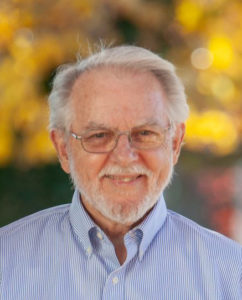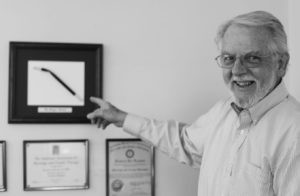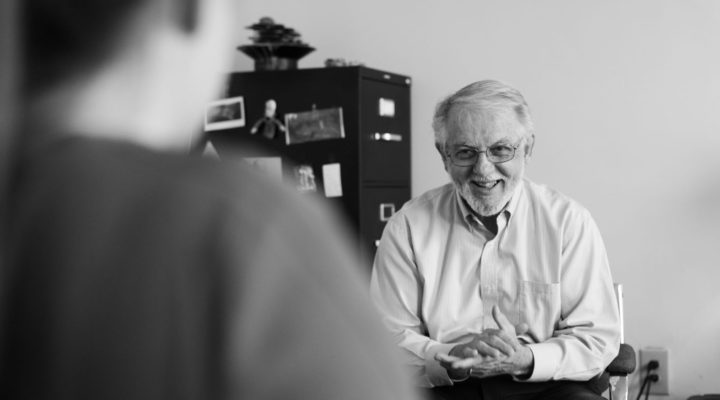Although Rick Landon never has taught English grammar, he has urged students to choose their pronouns carefully.
Paying attention to pronouns while praying is one way to start nurturing a closer relationship with God, said Landon, who recently retired as a spiritual formation professor at Baptist Seminary of Kentucky in Georgetown.
“Instead of saying, ‘Lord, go with me throughout this day,’ what if you said, ‘Lord, what are we going to do today?’” he asked. “It becomes a partnership.”
 Landon began teaching part-time at BSK when it opened for classes in August 2002, and he continued this adjunctive role through last academic year. He had anticipated teaching this semester, but a health challenge in early August kept him from the classroom. Fortunately, his health has improved, but at 78 he has decided to step away from teaching. He plans to continue his ministry as a pastoral counselor and spiritual director. He has worked at Interfaith Counseling Center at Calvary Baptist Church in Lexington, Ky., for 25 years and prior to that was pastor of Trinity Baptist Church in Lexington.
Landon began teaching part-time at BSK when it opened for classes in August 2002, and he continued this adjunctive role through last academic year. He had anticipated teaching this semester, but a health challenge in early August kept him from the classroom. Fortunately, his health has improved, but at 78 he has decided to step away from teaching. He plans to continue his ministry as a pastoral counselor and spiritual director. He has worked at Interfaith Counseling Center at Calvary Baptist Church in Lexington, Ky., for 25 years and prior to that was pastor of Trinity Baptist Church in Lexington.
“I think the one thing you can learn from studying, reading and praying the Scripture is that God wants a relationship,” Landon said. He added that within that relationship it is permissible to argue with God.
Landon explained there is nothing wrong with telling God you feel abandoned or that you are angry because you sense God is silent. These emotions are consistent with the biblical witness, he said. “Abraham, Moses and others in the Bible had relationships with God that were free and open.”
A key to spiritual growth is to “develop a rule of life or a rhythm of life.”
In his classes, Landon strived to help students develop their own spiritual lives and sought to equip them to lead church members toward more intimate relationships with God. Whether one is a layperson or a clergyperson, he said, a key to spiritual growth is to “develop a rule of life or a rhythm of life.”
“If you are an introvert, you may be able to sit quietly and do centering prayer three or four times a week,” Landon explained. “If you have an extroverted personality, then you may need to go for prayer walks. You need to go out and do something while you pray.”
Life situations also dictate how and when people commune with God, he noted. “If you are an older, retired couple, you probably have time to spend 35 to 45 minutes every morning in quiet reading the Bible and praying. If you are a young couple with three kids, there is no way you are going to be able to do that.”
Landon said people who are juggling multiple responsibilities can learn from the 17th century monk Brother Lawrence, whose classic book, The Practice of the Presence of God, emphasized the fullness of God’s presence can be experienced while performing everyday activities. “You can practice the presence of God while scrambling eggs and washing dishes,” Landon observed.
As he taught his classes, Landon was aware of the vital importance of a healthy spiritual life for clergy. “It is the foundation on which you build your ministry because ministry flows out of that,” he said. When such an emphasis is absent, Landon said, ministers are more prone to anxiety, depression, compassion fatigue and other maladies.

(photo by Joanna Lile)
In his counseling office hangs a framed magic wand that is broken. The symbolism suggests there is no magical solution to emotional or spiritual health. People move toward wholeness through intentionality, vulnerability and hard work, he said.
In terms of spiritual growth, a consistent devotional reading of Scripture and a faithful prayer life do not of themselves lead to a deeper relationship with God, Landon added. “It is more the accumulation of what happens through these experiences.”
His own spiritual journey blends his Baptist roots with other Christian traditions. When he was a teenager in Norman, Okla., his pastor, Edgar Hallock Sr., urged him and other teens to keep prayer journals and maintain a regular prayer list. While attending Southern Baptist Theological Seminary, he learned about the importance of God’s presence in pastoral counseling from Wayne Oates, and he gained a historical and ecumenical perspective on spirituality from Glenn Hinson.
In the 1980s, when he was pastor at Trinity, he sought spiritual direction from a Jesuit priest, Hank Kenney, who had moved to the city to begin a spiritual direction practice. “Father Kenney was gracious, and he affirmed a huge part of my background,” Landon said. “He said, ‘Rick, you have been doing this for years.’” While Landon never had heard terms such as “spiritual direction” or “spiritual formation” in his traditional Baptist upbringing, he said the guidance he received from his boyhood pastor and his spiritual director contained commonalities.
In his own ministry of mentorship and teaching, Landon has drawn on a wide breadth of spiritual experiences. He treasures the relationships be developed with seminarians across 18 years in the classroom.
“Teaching helped me not to become stagnant,” he said. “I not only passed along some of the things I have learned, that I have experienced, but students challenged me to learn some new things. Both of those things were important to me.”


